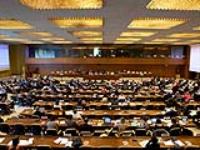
Press Release
UNAIDS’ new vision for the AIDS response endorsed by governing board
24 June 2010 24 June 2010Board meeting underlined importance of integrating HIV and sexual and reproductive health services and eliminating HIV-related stigma and discrimination

GENEVA, 24 June 2010 – The UNAIDS Programme Coordinating Board (PCB) endorsed UNAIDS’ new vision for the AIDS response during its 26th meeting, held in Geneva from 22 to 24 June. The new vision is “Zero new HIV infections. Zero discrimination. Zero AIDS-related deaths.”
As the HIV epidemic continues to evolve, the Board also endorsed a new mission statement for UNAIDS. It states, “UNAIDS, the Joint United Nations Programme on HIV/AIDS, is an innovative United Nations partnership that leads and inspires the world in achieving universal access to HIV prevention, treatment, care and support.”
“We must fundamentally refocus the AIDS response – and UNAIDS – if we are to achieve universal access,” said Mr Michel Sidibé, UNAIDS Executive Director. “Our new vision and mission reflect a dynamic approach to an epidemic in transition – delivering solid results in a world of competing priorities.”
A thematic session on linking HIV and sexual and reproductive health services was held on the first day of the PCB meeting. Participants reviewed the challenges of integrating such services, and shared lessons learned and best practices.
“The Millennium Development Goals will not be achieved without also ensuring universal access to sexual and reproductive health and rights,” said Mr Sidibé. “We must take the AIDS response out of isolation and promote an integrated health and development agenda. Every dollar invested in AIDS should be a dollar that strengthens national health systems.”
The Board reaffirmed its commitment to the elimination of HIV-related stigma and discrimination and reducing gender inequality, and called on Member States to remove punitive laws and practices that block effective responses to HIV and progress towards the Millennium Development Goals. It requested UNAIDS to strengthen its support to networks of people living with HIV and key populations at risk to measure HIV-related stigma and discrimination.
The Board also requested Member States, with support from UNAIDS, to increase the direct participation of people living with HIV and consider ways to involve key populations at risk in HIV programmes and data collection.
“We cannot reach vulnerable populations with life-saving public health services if their behaviour is against the law,” said Mr Sidibé. “We cannot ensure people who inject drugs and sex workers have access to harm reduction and HIV prevention services if they live in fear of being arrested.”
UNAIDS reaffirmed its commitment to reduce HIV transmission among men who have sex with men and transgender people. UNAIDS’ progress report on implementing the UNAIDS Action Framework: Universal Access for Men who have sex with Men and Transgender People was well received by the Board.
More than 300 participants and observers from Member States, international organizations, civil society and non-governmental organizations attended the meeting, which was chaired by the Netherlands with El Salvador acting as vice chair and Japan as rapporteur.
A complete record of the Board’s decisions, recommendations and conclusions as well as an overview of all documents presented at the 26th PCB can be found here.
Right Hand Content
Press centre:
Download printable version (pdf, 32 Kb.)
Contact:
UNAIDS Geneva
Dominique De Santis tel. +41 22 791 4767
desantisd@unaids.org
